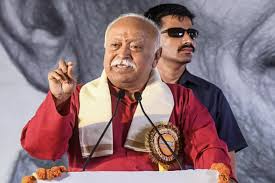RSS chief Bhagwat speaks of 75 and ‘stepping aside’

Mohan Bhagwat, the long-serving chief of the Rashtriya Swayamsevak Sangh (RSS), recently shared candid reflections on reaching the age of 75—a milestone that naturally invites thoughts on leadership succession and the future of the organization he has led for over a decade. Bhagwat’s comments reveal both a personal and institutional awareness about the inevitability of change and the responsibility that comes with handing over the baton to the next generation.
A Milestone That Invites Reflection
Turning 75 is not just a numerical landmark; it is a significant phase that often prompts leaders across various fields to evaluate their journey, their impact, and what legacy they wish to leave behind. For Bhagwat, who assumed the RSS leadership in 2009, this birthday marks more than just personal aging. It signals a moment to contemplate the direction of one of India’s most influential ideological organizations.
In his recent remarks, Bhagwat expressed that the age of 75 is a natural juncture to consider “stepping aside,” although he did not set any immediate timeline for this transition. This openness to change reflects a mature understanding that organizations must continually evolve, not just in ideology but in leadership, to stay relevant in a rapidly changing society.
The RSS and Its Leadership Culture
The RSS, founded in 1925, has long been a backbone of Hindu nationalist ideology and has played a pivotal role in shaping political discourse in India. The organization’s leadership traditionally follows a hierarchical yet consultative approach, emphasizing discipline, ideological consistency, and long-term vision.
Mohan Bhagwat’s tenure as Sarsanghchalak (chief) has seen the RSS expand its influence socially and politically, often through indirect engagement with political entities, including the ruling Bharatiya Janata Party (BJP). Under his guidance, the RSS has strengthened its grassroots reach while promoting cultural nationalism and social initiatives.
Leadership transitions within the RSS are rarely abrupt. They are carefully managed to preserve organizational unity and ideological clarity. Bhagwat’s comments about stepping aside resonate with this ethos of orderly succession, signaling that the RSS is preparing to embrace new leadership while maintaining its foundational principles.
Preparing the Next Generation
One of the core messages Bhagwat conveyed is the importance of preparing future leaders. Stepping aside, in this context, is not just about age or tenure; it’s about readiness—both of the outgoing leader and those who will take charge.
The RSS under Bhagwat has invested heavily in grooming young swayamsevaks (volunteers) to take on responsibilities at various levels. Leadership development is embedded in the Sangh’s educational and social programs, aiming to create a cadre that is ideologically aligned, disciplined, and capable of navigating India’s complex socio-political landscape.
Bhagwat’s acknowledgement of the need to “step aside” is a call to accelerate this process, ensuring the Sangh’s sustainability beyond his tenure. It also highlights a culture of self-awareness within the organization, where no one individual is seen as irreplaceable, but rather as a custodian of a larger mission.
A Message of Continuity and Change
Bhagwat’s reflections strike a balance between continuity and change. While he remains committed to the RSS’s core mission of cultural nationalism and social service, he recognizes that leadership renewal is crucial to keep the organization vibrant and adaptive.
This message is especially significant in the current context, where India faces evolving challenges—from demographic shifts and economic transformation to ideological debates and regional dynamics. The RSS, through its leaders, must respond to these challenges with both steadfastness and flexibility.
Public and Political Reactions
Bhagwat’s openness about stepping aside has garnered varied reactions from political analysts, party leaders, and the public. Some view it as a positive signal that the RSS is preparing for generational change, which could bring fresh perspectives while respecting its legacy.
Others see it as a subtle hint toward the future of India’s broader political and ideological landscape, given the RSS’s deep connections with the BJP. Leadership changes at the RSS could influence the political narrative, policies, and strategies of affiliated entities.
Notably, Bhagwat’s remarks also contrast with the often rigid perceptions of the Sangh’s leadership style, showcasing a nuanced and pragmatic approach that values organizational health over individual prominence.
The Larger Context of Leadership in Indian Organizations
Bhagwat’s stance is reflective of a broader conversation in Indian society about leadership transitions, especially in institutions that wield significant social or political power. As India’s population grows younger and new ideas emerge, established organizations must find ways to integrate youthful energy without compromising their core values.
In this sense, Bhagwat’s words offer a model of humility and foresight. Acknowledging the right time to pass the baton is a sign of strength, not weakness, and ensures that institutions do not become stagnant or overly dependent on a single figure.
What Lies Ahead for the RSS?
While Bhagwat has not announced any fixed retirement date or successor, his comments open the door for a transparent and thoughtful leadership renewal process. This may involve elevating leaders who have demonstrated both ideological commitment and strategic vision to steer the RSS through the next decades.
The coming years will likely see increased focus on leadership development, organizational reforms, and outreach programs to consolidate the Sangh’s position in India’s socio-political fabric.
Conclusion
Mohan Bhagwat’s reflections on turning 75 and stepping aside underscore a critical phase for the RSS and its future. His openness to leadership transition embodies a pragmatic vision that values continuity, sustainability, and renewal. As the RSS prepares for the next chapter in its journey, Bhagwat’s leadership and words will remain a guiding force, inspiring new generations of leaders to carry forward the organization’s mission with dedication and wisdom.






